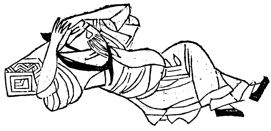
Table of Contents (translation)
Introduction
State of the Art
Aims and Methods
Part I: Lexical Preliminaries
1. Relevant Words
1.1 Mei
1.2 Ming
1.3 Qin
1.4 Wo
1.5 Shui
1.6 Wu and jiao
2. Conclusion
Part II: Sleep as a Natural Phenomenon
1. Explanations of Bodily Functions during Sleep
1.1 Intact Sleep
1.2 Disturbed Sleep
1.3 Dreams
2. The Identity of Sleep and Night
3. Wen Zhi's Teachings about Sleep
4. Conclusion
Part III: Sleep as a Social Phenomenon
1. The Constitution of the Social Relevance of Sleep
1.1 Sleep as Pleasure and Refuge
1.2 The Association of Sleep with Other Pleasures
1.2.1 Sleep and Eating
1.2.2 Sleep and Drinking
1.2.3 Sleep and Music
1.2.4 Sleep and Sex
2. Sleeping Time
2.1 Time
2.1.1 Nighttime is the Right Time
2.1.2 Daytime Sleeping
2.2 Duration
2.2.1 Early to Rise, Late to Bed
2.2.2 To Forget Sleep at Night
3. Circumstances of Sleeping
3.1 Diverse Instructions
3.2 Sleep and Filial Piety
4. Conclusion
Part IV: Sleep as a Psychological Phenomenon
1. Dangers of Sleeping
1.1 Murder in Bed
1.2 Sleep and Loss of Control as Topics in Legalist Writing
1.2.1 Suspicion towards Sleep
1.2.2 Sleep as a Metaphor for the Dispensability of Control
2. Sleeplessness
3. Conclusion
Part V: Sleep as a Counter Concept
1. The Praise of Dreamless Sleep
2. Sleep and Death
Summary
Appendix
Abbreviations
Chinese Dynasties
List of Primary Sources
List of Quotations from Primary Sources
Distribution of Relevant Words
Bibliography
Index
